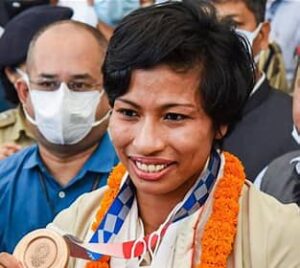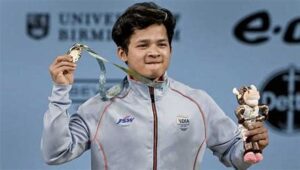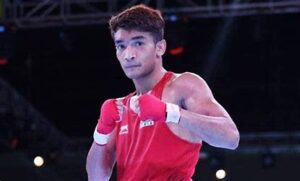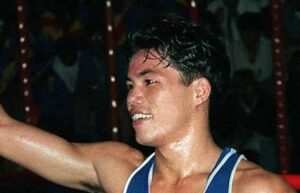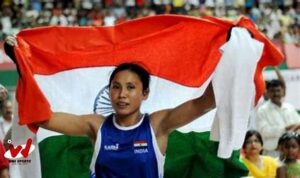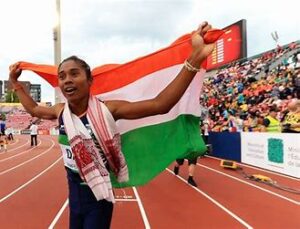In the world of Indian sports, few names resonate with the same passion and defiance as Laishram Sarita Devi. Hailing from the resilient land of Manipur, Sarita’s journey from a rural village to the global boxing arena is nothing short of extraordinary. Her story is one of grit, sacrifice, courage, and fierce determination—a shining example of how sheer willpower can defy all odds.
Often hailed as the “iron lady” of Indian boxing, Sarita Devi is not just a champion in the ring, but a symbol of empowerment, justice, and unwavering resolve. This blog explores her inspiring life, remarkable achievements, struggles, activism, and continuing influence on Indian sports, particularly in the Northeast.
Early Life: Humble Beginnings in Manipur
Laishram Sarita Devi was born on March 1, 1982, in the small village of Kakching Khunou in Thoubal district, Manipur. The sixth of eight siblings in a modest agricultural family, Sarita grew up amidst economic hardship and political unrest that often affects the northeastern states of India.
Her childhood was shaped by the struggle for survival. She would help her family with farming during the day and study at night under dim kerosene lamps. But in the face of adversity, her spirit remained undeterred.
Initially inclined toward athletics and football, Sarita’s turning point came during her school days when she watched fellow Manipuri boxer Mary Kom rise to fame. Inspired by Kom’s success, she turned her focus to boxing—a decision that would change the course of her life.
The Spark of a Boxer: Beginning of a Fighting Journey
Sarita Devi began her boxing training in 2000 under the mentorship of renowned coach L. Ibomcha Singh, who also trained Mary Kom. She later joined the Sports Authority of India (SAI) center in Imphal, where her raw talent and fearlessness were quickly noticed.
She made her national debut in 2000 and by 2001, she was already competing on the international stage. Her speed, stamina, and aggressive style made her a formidable opponent. She primarily fought in the lightweight (60 kg) category.
National and International Achievements: A Legacy of Gold and Glory
Sarita Devi’s illustrious boxing career is decorated with numerous medals and accolades. Her record showcases the impact she has had both nationally and internationally:
🥇 World Championships
- Silver Medal (2001) – At the AIBA Women’s World Amateur Boxing Championships in Scranton, USA, Sarita made her international mark with a silver.
- Gold Medal (2006) – She reached the pinnacle of her boxing career by becoming the world champion at the AIBA Women’s World Boxing Championships in New Delhi.
Asian Championships
- Sarita won gold medals in the Asian Women’s Boxing Championships in 2003 (India), 2005 (Taiwan), 2008 (India), and 2010 (Kazakhstan). Her consistent dominance across multiple editions cemented her status as one of Asia’s best.
Commonwealth Games
- Bronze Medal (2014 Glasgow) – She secured a podium finish at the Commonwealth Games, adding to India’s tally.
Asian Games (2014) – A turning point in her career
Sarita reached the semifinals of the 2014 Incheon Asian Games, where she controversially lost to South Korea’s Park Ji-Na despite clearly outperforming her. She was awarded a bronze medal—but what followed made headlines worldwide.
The 2014 Asian Games Controversy: Protest, Punishment, and Courage
The 2014 Incheon Asian Games became one of the most controversial moments in Sarita Devi’s career. After the highly disputed decision that awarded her semifinal bout to her opponent, Sarita publicly protested the result.
In an unprecedented move, she refused to accept the bronze medal during the official ceremony, instead handing it to Park Ji-Na. Her actions sparked global media coverage and triggered debates about corruption and partiality in international boxing.
While many hailed her as a hero, the International Boxing Association (AIBA) deemed her protest a violation of the code of conduct. As a result, Sarita was handed a one-year ban, barring her from international competitions.
Despite the personal and professional toll, she stood by her decision. Her protest is still remembered as one of the boldest acts of defiance against unfair judging in sports history.
Personal Life: Family, Motherhood, and Resilience
Sarita Devi is married to Th. Thoiba Singh, a former Manipuri footballer and her biggest supporter. The couple has a son named Tejas, born in 2013. Sarita often speaks about how motherhood has strengthened her will and inspired her to keep fighting.
Even while balancing family life and the responsibilities of being a mother, she remained committed to her boxing career. She trained rigorously and participated in tournaments even after her suspension, showcasing her unparalleled resilience.
Awards and Recognition
Over the years, Sarita Devi’s contributions to Indian sports have been honored with numerous awards:
- Arjuna Award (2009) – India’s second-highest sporting honor, recognizing her excellence in boxing.
- Manipur State Award for Sportspersons – Recognition from her home state for her achievements.
- Special honors from women’s rights organizations for being a role model in women’s empowerment.
Her protest at the 2014 Asian Games, while controversial, was later appreciated by many for highlighting corruption in sports and advocating athlete rights.
Life After the Ring: Coaching, Mentoring, and Giving Back
Sarita Devi may have stepped back from competitive boxing, but she remains deeply involved in the sport. She established the Sarita Regional Boxing Academy in Manipur to train and mentor young boxers—especially girls from marginalized communities.
Her academy aims to provide access to professional training, nutrition, and education to young talents who may otherwise be overlooked due to their economic or regional background.
She also serves as a national-level boxing coach and is active in conducting motivational talks, sports workshops, and campaigns for gender equality and athlete welfare.
Political Entry: A New Chapter in Public Life
In 2021, Sarita entered the world of politics by joining the Janata Dal (United) and contesting the Manipur Legislative Assembly elections from the Imphal East constituency. While she did not win, her political debut highlighted her continued desire to serve the people and work towards the upliftment of sports and youth in Manipur.
She expressed interest in policy-making for better sports infrastructure and athlete support systems, especially in the Northeastern states.
Impact on Northeast India and Indian Women’s Sports
Sarita Devi is more than a boxer—she is a cultural icon for Northeast India. Her journey has shattered stereotypes about women, regional identity, and socio-economic barriers. She stands alongside legends like Mary Kom, Mirabai Chanu, and Kunjarani Devi in showcasing the Northeast’s immense contribution to Indian sports.
By refusing to be silent in the face of injustice, Sarita has also become a beacon for athletes’ rights and fair play. Her story has inspired a new generation of female athletes from rural India to believe that they too can shine on the global stage.
Key Takeaways from Sarita Devi’s Life
- Courage isn’t the absence of fear, but the ability to fight despite it.
- True champions raise their voice against injustice—even at personal cost.
- Sport can be a powerful tool for social change and women’s empowerment.
- From a remote village to the world stage—no dream is too big.
Conclusion: The Legacy of Laishram Sarita Devi
Laishram Sarita Devi is not just a boxing champion—she is a warrior, a mother, a mentor, and a changemaker. Her legacy transcends medals and championships. She has changed the way we perceive women athletes, especially from the Northeast. Her fierce resilience, principled stance, and love for her people continue to inspire generations.
Even today, as she grooms the next line of champions and steps into public service, Sarita Devi remains a living embodiment of strength and dignity. Her fists may have brought her glory, but it is her unyielding spirit that truly makes her a national treasure.
